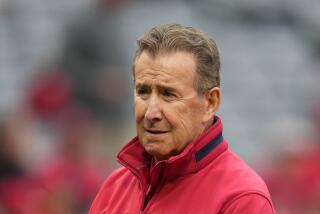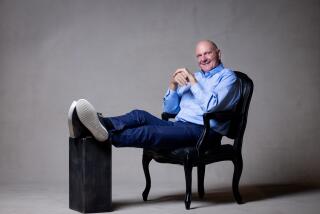His Kind Of Town
CHICAGO â Welcome to the city of Big Shoulders and Cheap Owners, where Papa Bear has been succeeded by Son-in-Law Bear; where the eccentric chewing gum magnate who turned the Cubs into a synonym for âsufferingâ has been replaced by a newspaper with no upturn in sight; where the boss Blackhawkâs name is cursed by fans listening to sold-out hockey games on radio because he wonât televise them.
Letâs face it, it shouldnât be hard to be the most popular owner in this town.
Jerry Reinsdorfâs three NBA titles, new ballpark and new stadium should have made him Santa Claus among weasels, but it hasnât worked out that way.
In a sports-mad city where teams are treated as royal houses and journeymen players as princes, the owners are seen as Scrooges, bottom line notwithstanding. Reinsdorf, who has a respectable record, financially and artistically, is known in Chicago as a cold-blooded, hard-hearted businessman. (OK, so theyâve got him there.)
Now, even as his Bulls chase their fourth title in the â90s, the bill of indictment grows:
Heâs underpaying local demigod Michael Jordan, hasnât rehired that wonderful Phil Jackson or local shaman Dennis Rodman.
He blackmailed the state into building his White Sox a new park, put it in the wrong place and erected a charmless cement oval instead of a Camden Yards or Jacobs Field.
He bought out popular Bill Veeck, lost popular Harry Caray, fired popular if erratic Jim Piersall and Doug Collins.
As baseballâs shadow commissioner, he pulled the strings on his Bud Selig puppet and stage-managed the baseball strike.
Every day, Reinsdorf picks up the papers to find his own people intriguing against him. Jackson expresses interest in the New York Knick job over and over. Thatâs a good one; after years of being pushed around by the Bulls, Knick management loathes the Zenmeister and, if the truth were to be told, Jackson would coach in the Black Hole of Calcutta first.
Jordan says a $36-million, two-year deal is his âabsolute bottom lineâ and threatens to play elsewhere for $10 million less if Reinsdorf âmesses with me.â Jordan later says this is âpurely speculation,â ducking the fact he was the one doing the speculating. A Sun-Times columnist rips the Tribune for âstuffing words in his mouth,â noting a fairer figure would be--brace yourself--$100 million for three seasons.
Just in case Reinsdorf thought he was out of the line of fire on this one, the Sun-Times adds:
âReinsdorf will try to negotiate with Jordan because it is his way of thrusting his ample business ego into the public eye, his attempt to be remembered as the dealmaker who never had to pay Jordan what heâs worth. Thatâs a good way to become a pariah-for-life.â
This, then, is your life, Mr. Pariah.
âSome flak from a few morons?â says Reinsdorf, doing nicely despite it.
âI donât mind being criticized for decisions. Thatâs part of the territory. I have to make some tough decisions. And so far, the recordâs not that bad.â
*
In real life, Reinsdorf is not cold or blustery, but friendly, relaxed and down to earth.
Sitting in his office in new Comiskey Park--he just closed the office in the Loop; others may call this a mausoleum but to him, itâs home--he asks if you want a soft drink or a cigar like the one heâs smoking. When he wants to check out a fact in his life story, he phones his brother Keith, whom he calls âKeithy.â
Howâs this for irony? When Reinsdorf was young, he had his heart broken by a calculating sports owner.
Yes, Reinsdorf grew up in Brooklyn and bled Dodger blue, lots of it.
âThe Brooklyn Dodgers were my religion,â he says. âEvery time Tommy Lasorda sees me, he comes over and makes a mark over my heart and says, âIf I cut you right here, youâll bleed Dodger blue.â
âAnd I always give him the same answer which is, âBrooklyn Dodger blue.â . . .
âI was devastated [when they moved]. The most emotional moment I had was the first time I set foot in Dodger Stadium. I just broke down and cried--this was some time in the â70s--at the thought the Brooklyn Dodgers were playing here. It was a spontaneous thing. All of a sudden, I just couldnât control myself.â
As testament to his devotion, Reinsdorf has two old-style wooden bleacher seats in his office from hallowed Ebbets Field. Typically, they came at a bargain price. Keith was riding by on his bicycle during the parkâs demolition and asked the workmen for the seats. Magnanimously, according to Jerry, the workmen asked for $5 and, even more magnanimously, settled for $3, which was all Keith had on him. He put the seats on his bike, walked it home and the family had a priceless heirloom.
Reinsdorfâs sports career has been similarly profitable, not to mention accidental. He was a trial lawyer for the IRS, became a successful tax lawyer and, after attempts to buy the Giants and Indians, put together a limited partnership that purchased the White Sox from Veeck in 1981.
First mistake: following Veeck.
Reinsdorfâs partner, Eddie Einhorn, made a famous remark, vowing to turn the White Sox into a âclass organization.â Veeck vowed heâd never attend another game and sneered at the new owners, as did the departing Caray in 1982.
The White Sox were a wreck, as in Veeck. Second fiddle to the Cubs, Veeck considered selling to a Denver group. If Reinsdorf saved baseball on the South Side, then and/or later when he entertained an overture from St. Petersburg, Fla., he got little credit for it.
Of course, with a new park and a franchise now worth $150 million or so, how much credit does a man need?
In 1985, on a lark, he put together a group that bought 57% of the Bulls for pocket change: $9.2 million. (Reinsdorf is thought to personally own 10%.) He got the idea from Yankee owner George Steinbrenner, a minority Bull owner.
Reinsdorf mentioned his interest to Steinbrenner. Grateful Bull ownership did the rest.
âThey were a pathetic organization at the time,â Reinsdorf says. âThe indoor soccer team was drawing more people than the basketball team. . . .
âAbout a week later, Lester Crown, who was one of the principal owners, called me. Heâd had this conversation with Steinbrenner and said, âI canât believe you really want to do this.â
âI said, âYeah, itâs true.â â
The deal went down. As timing goes, it was like Jed Clampett firing into the ground and striking oil. Reinsdorf wanted another team only to make a package deal with a local TV station. He got one that had drafted Jordan the year before, not that anyone--Bull officials, Jordan or Reinsdorf--dreamed what that would mean.
Reinsdorf was an old-style owner. He wasnât on a star trip (even now, heâs as likely not to grant an interview as to sit for one). He stuck to his business principles.
In baseball, that quickly made him a leading figure among owners. During the recent strike, union people fingered him as the chief hawk and power behind Seligâs throne; Reinsdorf says heâs flattered but itâs untrue. Even more flattering, union people paid Reinsdorf a backhand compliment, calling him one of the few owners smart enough to understand what was going on.
In basketball, the same principles made him a maverick. He sued the league in a dispute over putting his games on superstation WGN and won.
David Stern, last of the powerhouse commissioners, is no man to be trifled with, but then, neither is Reinsdorf.
âI have nothing but the utmost respect for David Stern, in all matters outside this litigation,â Reinsdorf insists. âHeâs very civil. We joke. When heâs in town, Iâll see him.
âNow, I donât go to the meetings, but that has nothing to do with the lawsuit. The reason I donât go to the NBA meetings is, nothing is done. Thereâs no participation by ownership in the running of the NBA. David does everything. David is the sole, absolute ruler.
âI asked David once, âWhat is your idea of the purpose of an ownersâ meeting?â
âAnd he said to me, âSo I can tell the owners what Iâve done.â
âWell, if thatâs the case, I can send somebody who can take notes. I donât have that much extra time to sit in a meeting and hear what Davidâs done. But heâs done a great job. Iâm not knocking the system.â
Thatâs as it should be. Financial World now estimates the worth of the Bulls at $178 million. Other owners suggest that however much mutual respect there is, a league meeting isnât a comfortable setting for Reinsdorf. At the 1995 All-Star game at Phoenix, for example, Reinsdorf was asked to step out of the room while other owners were briefed on their court case against him.
Reinsdorf left, snarling at his fellow owners to remember who had won.
Whether it makes him a hero (to the CEO set) or the Grinch Who Stole Mike (on Chicago sports talk stations), Reinsdorf never paid Jordan more than this seasonâs paltry $3.85 million. The owner never offered to redo the deal; the player never asked to renegotiate, although he did mention he was underpaid about a million times.
When Jordan recently let slip his number--$36 million for two more years--the feeling was that Reinsdorf will once again get away cheap. As usual, Reinsdorf isnât saying boo in public.
âI do not want this to be an adversarial relationship,â he says. âI like Michael and I respect Michael. I believe that Michael likes me and respects me.
âLetâs sit down and letâs just talk, and if we talk, I really believe weâll come to the right conclusion. Michael should not play for anybody other than the Chicago Bulls. Weâve got the statue in front of the stadium. He shouldnât play for anybody else, any more than Joe D should have played for anybody else at the end of his career or Ted Williams or Stan Musial.
âItâs abhorrent to me, the thought of Michael playing for somebody else. If it happens, Iâm not going to slit my throat, but itâs something I really would not want to see happen.â
The fans want Rodman. Reinsdorf is said to be worried at the prospect of a long-term contract with the irrepressible, 35-year-old Worm.
The fans want Jackson. Jackson supposedly wants something in the $3-million-a-year range. Zenmeisters donât come as simple as they used to.
âI like Phil,â Reinsdorf says. âI respect Phil, I hope we get it done. If we donât, we donât. Life goes on.â
Reinsdorf now winters in Phoenix. Insiders wonder how long heâll stay in basketball because his real love is baseball. With or without Mike, Dennis, Phil or the Bulls, his life will go on and everyone else will just have to get one.
More to Read
Go beyond the scoreboard
Get the latest on L.A.'s teams in the daily Sports Report newsletter.
You may occasionally receive promotional content from the Los Angeles Times.










